The top 50 most influential Black, Asian and minority ethnic leaders in English health and care – listed alphabetically
Sponsored by
A - F
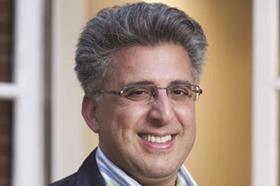
Dr Kamran Abbasi, editor-in-chief, British Medical Journal
Kamran Abbasi has been editor-in-chief of the BMJ since 2021 and has spent much of his career at the publication, first working there in 1997. He has led its international growth and helped its digital offering evolve, including creating e-learning resources for doctors’ professional development through BMJ Learning.
His period as editor-in-chief has included much of the covid pandemic. He has highlighted the impact covid has continued to have on the NHS and the need for public health measures to control the virus.
As well as contributing to radio and television, he is an honorary visiting professor at Imperial College London and is a member of the King’s Fund’s general advisory council. He trained as a doctor and worked in psychiatry and cardiology before concentrating on journalism. He is also editor of the Journal of the Royal Society of Medicine and JRSM Open.
Away from the BMJ, he writes on cricket for several publications, including Wisden, wrote a blog for ESPNCricinfo, and has written a book on British Asians’ relationships with cricket.
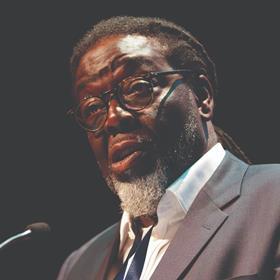
Lord Victor Adebowale, chair, NHS Confederation
As the chair of the NHS Confederation, Lord Victor Adebowale has seen his high profile continue over the last year and he is frequently in the media commenting on issues such as strikes and growing waiting lists. He has proved an effective spokesperson for NHS organisations, talking regularly about some of the longer-term problems they face – such as the need for capital investment – as well as the short-term pressures.
He took on the role in April 2020 and has worked closely with Matthew Taylor, who joined as chief executive in mid-2021. Together, they have emphasised the role of out-of-hospital care and community-led approaches to health and wellbeing, as well as health inequalities and inequities.
One of the first “people’s peers,” he was chief executive of Turning Point, a social enterprise which provided care services for people with complex needs, for 18 years. He was chancellor of the University of Lincoln for 15 years and a non-executive director on the NHSE board, as well as a founding board member of the NHS Race and Health Observatory.
Saj Ahmad, co-founder, of NHS Muslim Women’s Network and activist
Saj Ahmad is currently seconded with the joint cyber unit/digital policy unit in the transformation directorate, NHS England and the Department of Health and Social Care.
She is passionate about creating “safe spaces” where women can come together and share their experiences – which often include encountering sexism, racism, and misogyny as well as Islamophobia. This became particularly pertinent during the summer of 2024 as riots in several cities unsettled many NHS Muslim staff.
But the NHS Muslim Women’s Network – which was set up in the early days of the covid pandemic – is also about celebrating the success of women, regardless of background. The network has fed into the NHS Confederation’s work on covid and equality, diversity and inclusion. She has now stepped down as chair to focus on advocacy for ethnic minorities in the unions.
Ms Ahmad has encouraged men and white women to step up as allies and look out for colleagues who may not “be invited into the room”. But Muslim women don’t always fit into stereotypes and include those working in many different roles across the NHS, she argues.
She stood as the Labour candidate for Newark in Nottinghamshire in the 2024 general election, where she came within 3,600 votes of unseating Conservative Robert Jenrick.
Nadra Ahmed, chair, National Care Association
Social care remains a thorn in the side of the NHS and, even with a new government, solutions to the current crisis seem a long way off. Nadra Ahmed has effectively championed the sector for many years, serving as National Care Association chair since 2001, and building relationships across the interface with healthcare. She has been the registered manager of two care homes for older people and runs a homecare service. She also chaired the Care Provider Alliance, an umbrella body for social care providers, in 2022-23.
Ms Ahmed is a regular speaker at conferences and in the media and has sat on an expert group on social care capacity which advised the government. She is passionate about building the social care workforce and has warned the pandemic has eroded the sector’s resilience.
She was the vice chair of Skills for Care for 11 years, is a trustee of several charities and has served as both high sheriff and deputy lord lieutenant of Kent.
Mary Akangbe, founder and president, Zenith Global Health
Mary Akangbe has worked as a nurse in London for many years but has also used her skills and knowledge to have an impact across the globe, particularly in Africa.
Zenith Global Health works with established healthcare organisations and start-ups to improve productivity without compromising on care quality. Ms Akangbe has specialised in minimally invasive work for many years and argues that nurse surgical assistants are discouraged in the NHS and often end up leaving, despite the contribution they can make to services. She set up a Facebook group – “Not just a nurse” – to promote and celebrate their role and has been involved in work to develop induction and retention schemes for UK and overseas nurses.
Her work with Zenith concentrates on capacity building and skills transfer while integrating robust clinical governance. Zenith has also hosted healthcare awards and summits in Ghana and other African countries.
Duleep Allirajah, chief executive, Richmond Group of Charities
Duleep Allirajah has the job of ensuring the Richmond Group – a coalition of health and care-related charities – remains a strong voice for change for people with long-term conditions.
He spoke movingly at 2024’s NHS ConfedExpo about the importance of rehabilitation, based on the experience of his mother whose health and quality of life declined when she did not get the support she needed after a fall. The Richmond Group has also led work getting people with chronic health problems more active and overcoming some of the false perceptions about why they face barriers to this.
Mr Allirajah moved to the Richmond Group in 2022 from the Royal College of General Practitioners, where he led the development of its vision for general practice, Fit for the Future. Before that, he worked as head of insight and public affairs at the Parliamentary and Health Service Ombudsman and head of policy at Macmillan Cancer Support, where he won commitments on post-treatment support for patients.
He began his career as a welfare rights adviser.
Siva Anandaciva, interim co-director of policy, events and partnerships, The King’s Fund
One of the most prominent voices on NHS policy over the last year has been that of Siva Anandaciva. Since joining the King’s Fund in 2017, he has acquired many fans for the calm manner in which he dissects knotty NHS problems and his ability to distil complex issues into simple language.
He has led reports showing the UK’s high rate of deaths from treatable conditions compared with other countries and has highlighted the state of NHS estates.
Mr Anandaciva moved from NHS Providers, where he was head of analysis, looking at finances, workforce and informatics. He has also worked for the then Department of Health where he focused on medicines policy and urgent and emergency care.
He is a member of the Office of Health Economics’ policy committee and chairs the national payment strategy advisory group for NHSE.
More intriguingly, his Twitter profile describes him as a “pork scratching aficionado” and “Van Damme” fan.
Louise Ansari, chief executive, Healthwatch England
Louise Ansari took over the reins at Healthwatch England in 2022 and is also a non-executive director at Sussex Integrated Care Board, where she chairs the population outcomes committee.
She is vocal about the need for public input into shaping health and care services and for the voices of the most disadvantaged to be heard.
Her appointment came at a time of falling public satisfaction with the NHS, increasing access issues and a growing awareness of how health inequalities impact communities and their use of NHS services. Amid that she has found positive examples of local people and NHS organisations working together to drive improvement, highlighting how small improvements can drive patient experience and the need for real-time data to help understand that.
She was previously director of communications and influencing at the Centre for Ageing Better and also held senior leadership roles at Diabetes UK and Lambeth Council. She is also on the advisory group for the Patient Safety Commissioner.
She has written a guide to a “great later life” with practical advice for preparing for the late 60s and beyond.
Nafiza Anwar, director and co-founder, Association of South Asian Midwives
Nafiza Anwar is passionate about tackling the health inequalities faced by many mothers and babies and improving maternity services, not just for users, but for the staff working in them as well.
She qualified as a midwife in 2000, after 11 years working as a nurse, and now works as a lead midwife for maternal medicine in north east London. The Association of South Asian Midwives focuses on improving maternity services for both mothers and staff from marginalised backgrounds.
She is also a panel member for the MBRRACE-UK perinatal confidential enquiry, sits on a national equity and equality steering group, and is a member of London’s midwife equality, diversity and inclusion advisory group.
Her interest in international midwifery has led her to volunteer with the Bangladesh Royal College of Midwives twinning project and ASAM has also developed a welcome programme for internationally recruited midwives joining the NHS.
Samira Ben Omar, community organiser
Self-employed consultant Samira Ben Omar works to develop sustainable communities and develop digital health solutions.
She has spoken of the need to “create spaces” where a paradigm shift in the way organisations connect with communities can start and has suggested the structural reforms in the NHS provide an opportunity to address health inequalities but only if they focus on people and outcomes rather than activities and processes.
Ms Ben Omar worked in the NHS for 25 years in a variety of roles, including as a senior public health manager and for clinical commissioning groups. She is a board member of New Local, an independent think tank and network, as well as contributing to the King’s Fund leadership for population health programme and is a trustee of the Nuffield Trust.
She co-founded a community champions programme in Kensington and Chelsea which offers accredited training in public health to local people which can eventually lead to a paid position.
Karen Bonner, London regional chief nurse
It came as no surprise when Karen Bonner was appointed London’s chief nurse this summer: she had been tipped for a top job for several years and has long been recognised as one of the most inspirational chief nurses of her generation.
Ms Bonner has been chief nurse at Buckinghamshire Healthcare Trust since 2020 but worked in several London hospitals for much of her career. She is expected to take up her new role towards the end of the year.
She is a trustee at Helpforce, which promotes volunteering in health and social care and works with Prostate Cancer UK to raise awareness of the disease which killed her father and disproportionately affects Black men. Her mother – one of the Windrush generation – worked at Stoke Mandeville, now part of Ms Bonner’s trust, as a nursing aide and Ms Bonner says she could not wait until she was old enough to start her own nursing career.
Tanya Carter, chief people officer, East London Foundation Trust
Tanya Carter has been in her current role since 2018 but has worked in public-sector HR for more than 25 years.
She has worked in a primary care trust, in several acute trusts, in local authorities and in the education sector, as well as having a spell as a management consultant with PwC.
She is interested in quality improvement and acts as a QI sponsor for the trust, as well as leading the trust’s wellbeing agenda, focusing on the wider determinants of health for its 7,000 staff across north east London, Bedford, Luton and Milton Keynes.
During lockdown, she was involved in an initiative to provide online learning for employees’ children, to help their parents work effectively from home. She also pioneered #hellomynamereallyis, which encouraged staff to use their given names rather than changing them to more English-sounding ones.
She is co-chair of the London HR directors’ network, on behalf of NHS Employers.
Lord Ara Darzi, surgeon and former minister
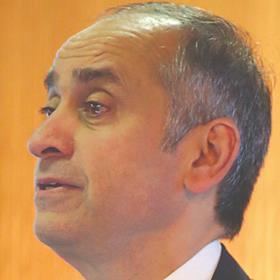
One of the new government’s first actions was to order an independent investigation into the state of the NHS, choosing former health minister Lord Ara Darzi to carry it out.
Lord Darzi, who was born in Iraq to Armenian parents and studied medicine in Ireland, was a minister under Gordon Brown after developing a healthcare strategy for London and acting as a national adviser in surgery for the then Department of Health. He produced the “next stage review” for the government which was partially implemented.
After he left the government, he returned to clinical and academic work including as chair of the Institute for Global Health Innovation at Imperial College. He has spoken out about Armenian issues, visiting the country to train doctors and helping supply hospitals with equipment. He was chosen to carry the Royal Armills – a form of metal bracelet – at the King’s coronation.
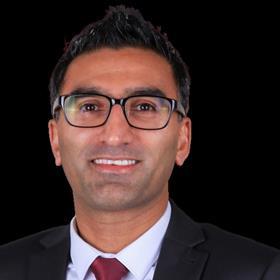
Salman Desai, deputy chief executive and director of strategy, planning and partnerships, North West Ambulance Service Trust
Salman Desai is one of the few Black, Asian and minority ethnic executive directors in the ambulance sector. He has worked in the ambulance service for more than 25 years and is a registered paramedic. He was head of service development at NWAS for eight years during which time he focused on preventing death from drug use among marginalised communities in Greater Manchester. He later joined the board as director of strategy and planning. He has worked to improve equality, diversity and inclusion within the trust and regionally, being prepared to facilitate uncomfortable conversations on subjects such as misogyny, abuse of power and racism in the workplace.
He is due to be interim chief executive of NWAS for a period when Daren Mochrie leaves at the end of November 2024.
He played a key role in the trust’s response to two major incidents in Cumbria – shootings in and around Whitehaven in 2010 and then floodings which led to mass evacuation from several areas. He was also seconded into the acute sector for two years as a transformation director.
Dr Vin Diwakar, interim national transformation director, NHS England
Vin Diwakar has been tipped as a potential replacement for NHSE medical director Stephen Powis, who is expected to step down next year.
He has worked at regional and national levels for more than seven years, initially as London regional medical director and then moving into various national roles for NHSE. Before this, he worked as medical director at Great Ormond Street Hospital for Children FT and Birmingham Children’s Hospital.
His current role requires him to think about the big questions facing the NHS – how data is shared and what outpatients will look like in the future, for example.
He has said NHSE was taking “all possible steps” to ensure suppliers complied with its stance on equality, diversity and inclusion after TPP chief executive Frank Hester allegedly made racist comments.
He was involved in developing proposals for the NHS long-term plan on prevention and health inequalities and contributed to the NHS Constitution.
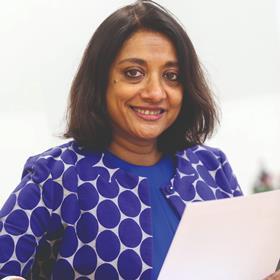
Dr Navina Evans, chief workforce, training and education officer, NHS England
Navina Evans has come through a challenging time recently with much criticism of NHSE’s workforce plan and controversy over some of the newer associate roles it includes.
She has insisted that NHSE will “mainstream” its equality, diversity and inclusion work rather than having a dedicated team where it is “parked” and has argued for the benefits of having a diverse workforce. She has also argued NHS leaders should act on the “shameful” level of sexual harassment.
Dr Evans previously headed Health Education England, which was eventually merged with NHSE. Before that, she was chief executive of East London Foundation Trust, a major mental health provider. She had worked at the trust as a child and adolescent psychiatrist before taking on more managerial responsibilities.
She is a trustee of Think Ahead, which develops training programmes for mental health social work.
Professor Kevin Fenton, London regional director for public health
Kevin Fenton’s career has included major roles in both the US and UK. He is currently president of the Faculty of Public Health, statutory adviser to the Mayor of London, and regional director at The Office for Health Improvement and Disparities as well as London regional director for public health. He also advises the government on HIV and is a board member of the NHS Race and Health Observatory.
He came to the fore during covid when he highlighted the disproportionate impact on ethnic minorities, describing the pandemic as “shining a light on inequalities… it was so distressing to see how fast those inequalities appeared.”
After medical school and working in hospitals in Jamaica, he moved to the US where he specialised in sexually transmitted diseases and was appointed director of the National Centre for HIV/AIDS, viral hepatitis, STD and TB Prevention, part of the Centres for Disease Control and Prevention.
He moved to the UK to join Public Health England, as head of its health and wellbeing division. He was later seconded to the role of director of health and wellbeing at Southwark Council.
Francis Fernando, founder, Filipino Nurses Association UK
Filipino nurses have become a vital part of the NHS workforce over the last few years with nearly 50,000 working in the UK – but have often had little voice and many have struggled to progress to higher banded jobs.
This has changed, partly due to the work of Francis Fernando who set up the Filipino Nurses Association UK to represent them and to push for greater recognition of their talents. The organisation was also instrumental in highlighting the high death toll among Filipino staff during covid – Mr Fernando believes 57 lost their lives.
Mr Fernando has also developed mentoring for Filipino nurses and has seen many move on to higher bands and executive roles. He has also taken up cases of nurses who have been badly treated by their UK employers, both in the NHS and in the private sector.
Mr Fernando has worked in the NHS since 2000 in a variety of roles, including senior positions at Central London Community Healthcare Trust and North East London FT. As well as being a Florence Nightingale leadership scholar, he was a top 10 finalist in the Aster Guardians Global Nursing Awards in 2022 – the only NHS nurse on the list.
Cedi Frederick, chair, Kent and Medway Integrated Care Board
Cedi Frederick has taken on the somewhat daunting task of improving healthcare in Kent and Medway, an area with a chronic GP shortage, a maternity scandal and a funding gap. He has thrown himself into the role, emphasising the need for partnerships beyond the NHS and getting out to meet leaders – and grassroots staff – of different organisations across the county.
Mr Frederick came to the Kent role having had extensive NHS experience as a chair and non-executive director at trusts in London and Hertfordshire. He had also been a non-executive at housing associations, in the university sector and was a board member of Basketball England. He has led a mental health charity and a Kent-based social care provider.
He chairs the Health and Europe Centre, and NHS London’s vaccine legacy and health equity group, as well as running a digital health system company and a consulting company.
G - O
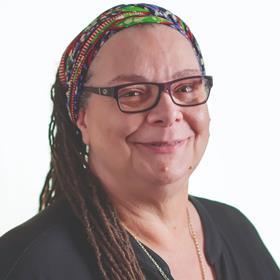
Marie Gabriel, chair, NHS Race and Health Observatory
As chair of the NHS Race and Health Observatory, Marie Gabriel has helped steer it through the covid period and into its key role in identifying and tackling ethnic inequalities in health and care.
Ms Gabriel has extensive experience as an NHS chair and currently chairs the North East London ICB. She had previously chaired two mental health trusts – Norfolk and Suffolk FT and East London FT.
She has also taken on other health-related roles, including as an associate director at the UK Health Security Agency, as a commissioner looking at the links between health and prosperity for the Institute of Public Policy Research, and as a member of the Mayor of London’s health board.
She is co-chair of the NHS London People Board and a member of its equality, diversity and inclusion advisory group.
Much of her work has focused on the needs of marginalised groups, as well as promoting equality and diversity. She is a trustee of two charities in East London.
Dr Aruna Garcea, chair, NHS Confederation primary care network advisory group
Aruna Garcea is a passionate advocate for primary care and its role in developing innovative and responsive services to grassroots health needs. At the NHS Confederation, she has promoted working with networks representing other parts of the NHS on cross-cutting issues such as workforce and estates.
She argues an at-scale model for primary care is helping to deliver improved services, such as covid vaccinations and other preventative measures, and ultimately will increase capacity. She has called for more local autonomy for PCNs, while recognising the pressures GPs and primary care teams are under.
Dr Garcea is a practising GP in Leicester and clinical director of Leicester City and Universities PCN, as well as acting as medical adviser for networks and partnerships at Leicester, Leicestershire City and Rutland Patient Care Locally, which is a GP federation. She also acts as a women’s health champion with the local ICB.
She has a particular interest in using digital and workforce innovation to transform pathways.
Dorcas Gwata, public health activist
Dorcas Gwata has worked with young people and families affected by gang culture in London, using a “street clinic” approach to engage with young people wherever they were and gain their trust. Many of them were at risk from knife crime and exploitation but came from deprived backgrounds.
This pioneering work has led to national recognition for her. In 2020 she returned to working in emergency medicine in a hospital as part of the covid response. She is now based at Central and North West London FT.
Her career journey has taken her from cleaning hospitals in Scotland through working as a healthcare assistant to a mental health nurse specialist. She is a visiting lecturer at two London universities as well as acting as an adviser to several organisations such as the Tropical Health Education Trust. She also travels regularly to Africa where she is involved in several projects. She co-founded the Global Health Cafe, which looks at global health issues with a particular focus on Africa.
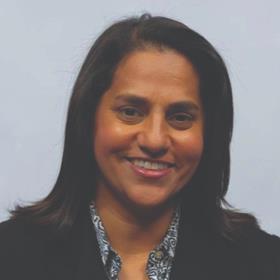
Sam Haq, public accountability, communications and engagement director, NHS England
Former ITV news editor Sam Haq is now the woman in charge of managing communications for NHSE – a daunting prospect but one she seems to relish.
Ms Haq has extensive experience in government communications, having been director of communications for the Department of Transport for two years and before that head of news at the Ministry of Justice for five years. As an ex-TV journalist with two decades of experience working on home and foreign news before leading ITV News’s Westminster team, she will know how to work with the media.
However, her role is far bigger than that of her predecessors and she won’t be spending much time manning the phones in the NHSE press office. In fact, she will probably be determined that the news is never about her and always about the work of the NHS – a position probably made easier by the blank slate a new government offers.
Professor Kamila Hawthorne, chair, Royal College of General Practitioners
Kamila Hawthorne will lead the RCGP until late 2025 through what could be a stormy time as it grapples with GP funding issues and the roles of physician associates.
Professor Hawthorne is a part-time salaried GP in South Wales who has a long record of involvement in medical education. She is head of graduate entry medicine at Swansea University and director of medical education at the University of Surrey. She is a previous vice chair for professional development of the college as well as being an examiner for the membership exam.
She has a longstanding interest in Black, Asian and minority ethnic communities’ access to healthcare, especially around type 2 diabetes. She set up a project in Cardiff to raise awareness of diabetes and heart disease, as well as publishing a Cochrane Review on culturally appropriate diabetes education for ethnic minority groups. She has also won numerous prizes for her work in both teaching and clinical practice.
Jinjer Kandola, chief executive, Barnet, Enfield and Haringey Mental Health Trust and Camden and Islington Foundation Trust
Jinjer Kandola has spearheaded a recruitment campaign called “Someone Like Me” which has helped recruit people from the deprived communities her two organisations serve – including those with lived experience of mental illness – to NHS roles. It is a project which chimes with her own experience of believing that she would never be an NHS chief executive – she has spoken of the “double whammy” of being a woman and from an ethnic minority – and her desire to find people with potential.
She has run the two trusts since 2021, walking a delicate line between not fully merging but operating as the North London Mental Health Partnership. It has not always been an easy ride, with NHS London threatening to remove Camden and Islington’s governors when they opposed the idea of a joint chair.
Before that, she ran BEH in 2018, after working as deputy chief executive and director of workforce and organisational development at Hertfordshire Partnership University FT.
Professor Partha Kar, campaigner for racial equality and improved diabetes care
Partha Kar has been a long-standing feature on the top 50 list but in the last year or so has changed roles. He is now a council member of the Royal College of Physicians and a clinical adviser on international medical graduates for the General Medical Council.
He remains involved with NHSE, leading on digital and technological solutions for people with type 1 diabetes, and is the clinical lead for diabetes with Getting It Right First Time, but stepped down as national speciality adviser on diabetes this March.
His work has included introducing technology to help people manage and monitor their type 1 diabetes and pioneering the introduction of the “super six” model for diabetes care.
He is a prolific social media user and has highlighted the discrimination international medical graduates face in the NHS and raised safety concerns around the use of physicians’ associates in some roles.
Sadiq Khan, Mayor of London
Sadiq Khan was re-elected as mayor for a third term this year and has weathered the storm over the extension of London’s ultra-low emission zone, the largest clean air zone in the world.
It is partly his championing of air quality in the capital which will be his legacy on health: the expansion of it to all London boroughs in 2023 has reduced the number of older, more polluting vehicles on the roads and led to lower levels of nitrogen oxide and particulates in the air. Air pollution has been linked to 4,000 premature deaths a year in the capital, many of them among the most deprived populations.
Mr Khan was previously a Labour MP and had been a transport minister under Gordon Brown. During the covid pandemic, he declared a major incident in London because infection rates were hitting one in 20 in some parts of the capital and initially reduced some public transport services. He maintained a face mask requirement on public transport for longer than the government did nationally.
Nikhil Khashu, interim chief executive, Warrington and Halton Teaching Hospitals Trust
Nikhil Khashu is currently the interim chief executive at Warrington and Halton Teaching Hospitals, on a two-year secondment from NHSE’s North West regional team, where he was director of finance. He is set to become joint chief executive of WHH and Bridgewater Community Healthcare FT in November. He has also held director-level jobs at Calderstones Partnership FT and St Helens and Knowsley Teaching Hospitals Trust, as well as working as NHSE’s interim deputy chief finance officer. He was director of finance at St Helens and Knowsley when the trust was rated outstanding by the Care Quality Commission and top in the country in the national staff survey.
A long-term Warrington resident, he joined the NHS as a national financial management trainee in 1997. He has worked across the North West region and with many providers, as well as with the then strategic health authority. He is deeply interested in health inequalities and the equality, diversity and inclusion agenda, as well as developing finance professionals.
Paulette Lewis, president, Caribbean Nurses and Midwives Association
Paulette Lewis is a management consultant specialising in nursing and midwifery, with more than 35 years of experience in healthcare. She has held several executive posts – achieving her first director of nursing post in 2005 when very few ethnic minority nurses reached that level – and was director of the pan-London maternity service review, which looked at capacity and demand in maternity services across the capital.
She is the chair of Croydon BME Forum and former president of the Jamaica Nursing Association. She has also advised the chief nurse on BME issues and sat on the Nursing and Midwifery Council board as well as being a non-executive director for a clinical commissioning group.
She has also worked in Africa to support improvements in maternal and infant mortality rates in Chad. She has received awards for her work in the charity sector and from the Jamaican Prime Minister.
Christiana Melam, founder and chief executive, National Association of Link Workers
Link workers offering non-medical alternatives to patients experiencing social issues have become a crucial part of primary care teams in many areas: Christiana Melam has highlighted their value to the NHS and patients and advocated for recognition through her role as chief executive of the National Association of Link Workers.
She describes those helped by link workers as often being let down by society or needing help and guidance.
The NALW offers a collective voice and accreditation for link workers and promotes education and professional standards. She says that, in setting it up, she faced challenges due to being Black and a woman – but would not “just go away” and eventually got people to listen to her.
She set up the annual Social Prescribing Link Worker Day and is an international social prescribing link worker champion. Her work has been recognised by being a finalist in various awards.
She believes that empowering individuals and communities to take control of their own lives is vital if healthcare is to be transformed.
Patricia Miller, chief executive, Dorset Integrated Care Board
Patricia Miller has run Dorset’s integrated care board since 2022, the culmination of more than 30 years working in the NHS. But she has publicly said the NHS has “lost its way” and needs to get back to working with and listening to communities to drive down health inequalities.
She has pointed to the lack of infrastructure to support those living in deprived areas and warned the NHS is not paying enough to allow its employees on the lower bands to live “a basic life”.
As a Black woman, she has spoken of being “scrutinised twice over” and the importance of mentoring, supporting and breaking down barriers for others. Previously she ran Dorset County Hospital FT for nearly eight years and was one of the youngest directors of information management and technology at 28.
She is vice chair of NHS Employers policy board.
Acosia Nyanin, deputy chief nursing officer, NHS England
Acosia Nyanin has been deputy chief nursing officer for professional and system leadership at NHSE since July 2023 and would have been one of the contenders for the chief nurse post. Although she missed out this time round, she may well be a future chief nurse.
She has urged chief nurses to retain a focus on equality, diversity and inclusion in their workplaces and to protect patients and staff from the “devastating” impact of discrimination.
Ms Nyanin, a registered mental health nurse, moved to the centre from NHSE in the South East where she was the regional chief nurse. She has also worked at Sussex Partnership FT, the Priory Group and the Care Quality Commission, where she was head of inspection for adult social care. She is also a trustee of Macmillan Cancer Support.
But her career started with admin work – first in financial services and then in the NHS, where she was encouraged to move into nurse training. She then spent 13 years working at Camden and Islington FT.
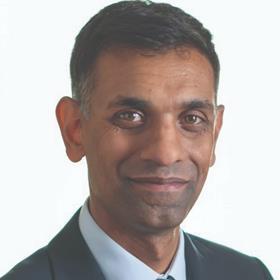
Professor Habib Naqvi, chief executive, NHS Race and Health Observatory
Habib Naqvi has led the NHS Race and Health Observatory since it was set up in 2021 and has seen it become an influential voice in the NHS with a focus on research and evidence-based recommendations to address ethnic inequalities in health and healthcare. The NHS RHO also produced its own manifesto before the election, calling for any new government to adopt transformative change to drive greater health equity.
He leads the UK-US bilateral relationship between the NHS RHO and the Centers for Disease Control. Previously he was policy lead and interim director for the NHS Workforce Race Equality Standard during his time at NHSE and led the inclusion of WRES within national policy levers.
He also worked on equality and diversity policy for the then Department of Health, where he coordinated the health sector’s response to the review of the public sector equality duty. He is a fellow of the Faculty of Public Health, sits on various committees and advisory boards and is a board member of Somerset County Cricket Club.
Ruth Oshikanlu, expert in trauma-informed care
Nurse, midwife, and health visitor Ruth Oshikanlu is an expert in delivering projects which meet the needs of vulnerable and socially excluded groups as well as supporting families who have suffered pregnancy loss or are struggling with assisted conception.
Many of these groups suffered anxiety and distress during the covid pandemic, as services closed or changed. She launched an online platform to support pregnant women and new mums at risk of isolation and an online forum for nurses, midwives and health visitors to give them somewhere to discuss their concerns.
She was awarded a Churchill Fellowship and was able to use this to look at trauma-informed approaches to care, arguing a preventative approach needs to be taken to young peoples’ violence which is often linked to childhood trauma.
Her early career included working for the Family Nurse Partnership, an intensive parenting programme for vulnerable families, and leading a young people’s health and wellbeing service.
She has written several books, including on bringing up babies, and is a regular lecturer and columnist.
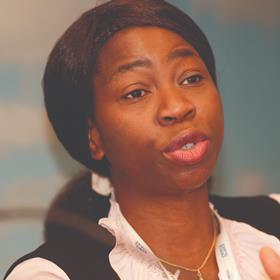
Professor Bola Owolabi, director for health inequalities, NHS England
Bola Owolabi leads the national healthcare inequalities improvement programme at NHSE. She has spearheaded the Core20PLUS5 approach for integrated care boards, which both sets national priorities and allows them to identify additional local priorities to reduce health inequalities.
She has called on leaders to “embrace their own agency” to act on health inequalities rather than relying on ringfenced money because of the risk that only things which were included in ringfencing got done. She has also expressed concern the lessons learned during covid were being forgotten.
Professor Owolabi is a GP in the Midlands and a former national speciality adviser for older people and integrated person-centred care at NHSE.
She is a vice president of the Royal Society of Public Health and has worked on international collaborations, as well as having worked in several roles in the Derbyshire health system.
P - Z
Professor Kiran Patel, chief medical officer, University Hospitals Birmingham Foundation Trust
Kiran Patel moved to University Hospitals Birmingham FT this year after five years as chief medical director and deputy chief executive at University Hospitals of Coventry and Warwickshire Trust. He is also a consultant cardiologist.
He has the potential to make a big impact in England’s second city: at Coventry and Warwickshire, he pioneered work on health inequalities including the thorny question of who should be offered elective care first when waiting may have inequitable effects on similar patients from different backgrounds. He is also likely to play a pivotal role in improving the culture at UHB.
Professor Patel also served as a regional medical director for NHSE in the West Midlands and as clinical director of the area’s strategic health authority.
He set up the South Asian Health Foundation, which looks at health inequalities in the UK, after seeing many people in the local community die early. He is also a mentor for the Social Mobility Foundation.
Professor Mahendra G Patel, director, Centre for Research Equity, University of Oxford
Mahendra Patel is a pioneering pharmacist dedicated to reducing health inequalities and addressing research disparities in ethnic minority and underserved communities, driving improvements in population health.
He is the founding director of the Centre for Research Equity at the University of Oxford’s Nuffield Department of Primary Care Health Sciences, a culmination of his leadership in the Principle and Panoramic covid-19 treatment trials, to drive forward inclusive research across the UK.
Professor Patel has held national leadership roles, including as an elected board member and treasurer for the Royal Pharmaceutical Society. At NICE, he founded the NICE Student Champions initiative, which became a national programme across more than 40 university healthcare faculties.
His efforts to advance health equity led to the ministerial launch of a landmark collaboration between the Centre for Research Equity and the Health and Social Care Research and Development Division in Northern Ireland, with support from the Department of Health Northern Ireland and key agencies.
This partnership marked a significant step toward improving health outcomes, reducing disparities, and ensuring that research benefits reach all communities.
Helga Pile, acting head of health, Unison
If the government ends up in another dispute with health unions, Helga Pile will be a key figure – as she was during the strikes of 2023.
She has been forthright about the need to resolve the NHS’s staffing problems and to ensure that pay is sufficient to attract and retain the workforce needed to bring down waiting lists. She has also called for changes in ambulance workplace culture and highlighted the level of discrimination faced by many nurses from a BAME background.
Ms Pile has worked for Unison since 2006, initially leading social care before moving to the health group. She is the trade union side chair of the National Social Partnership Forum and staff side chair of the NHS Staff Council.
She had previously worked for the GMB, the Low Pay Unit and Income Data Services, and wrote a report about the labour market experiences of professionally qualified refugees.
Earlier this year at the Unison health conference, she critiqued the handling of the NHS since 2010 and said a new government would bring “hope”.
Steve Russell, chief delivery officer, NHS England
Former trust chief executive Steve Russell joined NHSE in February 2022, initially to lead on covid and flu vaccination programmes. He then moved into the chief delivery officer role.
He was chief executive of Harrogate and District FT from April 2019 until his secondment to NHSE. He has also worked as NHS Improvement’s London regional director and as deputy chief executive at Barking, Havering and Redbridge University Hospitals Trust. He also oversaw the creation of an NHS Nightingale Hospital at Harrogate Convention Centre, although it never saw any patients.
While at Harrogate, he was racially abused while walking home after England’s Euro 2020 victory over Germany, something which he said left him feeling “lonely” and “shocked”. “It happens to many people too often and it happens in the organisation I am responsible for,” he said. He has also said that BAME staff members “deserve better”.
Sim Scavazza, deputy chair, Buckinghamshire, Oxfordshire and Berkshire West Integrated Care Board
Sim Scavazza is deputy chair of Buckinghamshire, Oxfordshire and Berkshire West ICB and is also a non-executive director of Imperial College Healthcare Trust and London North West University Healthcare Trust.
From May 2023 until September 2024, she was the ICB’s acting chair, stepping into the role at a point where BOB had lost both its permanent chair and chief executive and was facing significant cuts in staffing levels, with several interims and high turnover of staff in key roles.
This April, she was appointed chair of the NHS Seacole Group and is an adviser on race for NHS Providers.
She had a 25-year career in the fashion industry, working for retailers such as River Island and Miss Selfridge. She has held many posts in charities and the education sector, including as deputy chair for the University of the Arts in London.
Shohail Shaikh, former co-chair, NHS Muslim Network
HR professional Shohail Shaikh was a co-chair of the NHS Muslim network from June 2022 until September 2024. The network aims to inspire, celebrate and champion the contribution of the NHS Muslim community.
It is concentrating on building allyship, supporting staff to speak up and increasing awareness. During his time as co-chair, the organisation has run talent development webinars and offered career development support as well as supporting members through Ramadan and Al Fitr. Mr Shaikh worked alongside fellow co-chairs Halima Dagia and Riyaz Patel.
Mr Shaikh is head of organisational development and talent management at London Ambulance Service Trust. He has worked in several NHS roles in London since 2019. Before that, he had worked in Saudi Arabia.
He has featured on multiple lists of influential Muslim and ethnic minority leaders and has won awards for his work in equality, diversity and inclusion. He says there is no greater satisfaction than helping others unlock their potential.
Dr Shubulade Smith, president, Royal College of Psychiatrists
Shubulade – Lade – Smith is a consultant psychiatrist at South London and Maudsley FT. She was elected president of the Royal College of Psychiatrists in 2023 – the first Black president of the college. In 2024, she became a board member of the NHS Race and Health Observatory.
She is renowned for her work on anti-psychotic medications and their hormonal and reproductive effects. Her work has a strong academic focus, and she is also a visiting senior lecturer in the Department of Forensic and Neurodevelopmental Sciences at King’s College London.
She has been a presidential lead for race and equality at the RCP as well as clinical and strategic director with its National Collaborative Centre for mental health.
She has pointed out how cultural stereotypes and assumptions influence rates of detention of Black people and her research into the management of violent behaviour and forced injections has influenced national guidance. She has campaigned for greater resourcing of mental health services, pointing to the impact of austerity on mental health crises and involuntary admissions.
Sheilabye Sobrany, president, Royal College of Nursing
Sheilabye – Sheila – Sobrany has been RCN president since the start of 2023, a particularly challenging time for the organisation after the publication of an independent review into its culture.
Ms Sobrany pledged to root out the poor behaviours the review identified and hold people to account. One of her focuses as president has been building relationships with nurses educated overseas and organisations representing them.
She has also had to oversee a time of change with a new chief executive and general secretary, a change of government and renewed pressure over pay.
She sits on the chief nursing officers’ BME strategic advisory board and founded and chaired a network for healthcare academics concerned about race equality, diversity and inclusion.
She is a senior lecturer in adult nursing at the London South Bank University and sits on the RCN London board, as well as its council. She has worked both in the NHS and in the independent sector.
Professor Laura Serrant, chair, Sheffield Children’s Foundation Trust
Laura Serrant has had a distinguished career as a nurse and academic and this year took on the job of chair at Sheffield Children’s FT – where she was on placement as a student nurse in 1983.
She was the regional head of nursing for NHSE in the North East and Yorkshire but has recently stepped down, and was a professor of community and public health nursing at Manchester Metropolitan University.
Professor Serrant is a specialist in sexual and reproductive health who has worked with sex workers, and those dependent on drugs and alcohol.
She is a former chair of the chief nursing officer’s BME strategic advisory group for NHSE and has served on many committees, including being a trustee of the Florence Nightingale Foundation. She was also a non-executive director at Sheffield Health and Social Care FT and Heart of England FT.
Ming Tang, chief data and analytics officer, NHS England
Ming Tang has survived all the upheavals in the NHS’s structure to secure her role as chief data and analytics officer. Her portfolio includes AI strategy and the controversial Federated Data Platform. She has been clear that the NHS needs to bring the public along as it develops more sophisticated uses of data.
She joined the NHS in October 2009, working as managing director for healthcare commissioning services in the West Midlands and then as managing director for South Yorkshire and Bassetlaw Commissioning Support Unit. She had previously worked in management consultancy and the pharmaceutical industry after qualifying as a pharmacist.
After her move to NHSE in 2013 as director of data and information management systems, she went on to lead a 300-strong team of data analysts during covid. She has been named as the most influential person in data and analytics in the UK and won a “covid unsung hero” award by Women in Science and Engineering.
Dr Ranee Thakar, president, Royal College of Obstetricians and Gynaecologists
Ranee Thakar has been a leading campaigner for addressing inequalities in women’s health and has been co-chair of the race equality taskforce at RCOG.
She took over as RCOG president in December 2022, having been senior vice president for global health for the previous three years. She had been instrumental in getting funding for projects to improve healthcare professionals’ gynaecology skills in Bangladesh and promote safe abortion and contraception in sub-Saharan Africa. Expanding RCOG’s global initiatives to improve outcomes for women and babies is one of her aims as president, along with sustainability and climate change.
Dr Thakar is a consultant obstetrician and urogynaecologist at Croydon University Hospital and also an honorary senior lecturer at St George’s University of London. She has specialised in urogynaecology and has led the perinatal pelvic health project and urogynaecology network for South West London.
Sue Tranka, chief nurse, Wales
Sue Tranka was appointed as the chief nursing officer for Wales in 2021 after working as deputy chief nursing officer for patient safety and innovation at NHSE for 18 months. She also led on infection prevention and control during that period, which included much of the covid pandemic.
She has said her priorities include making nursing and midwifery an attractive career option, improving outcomes and creating a workforce which reflects the population it serves and addresses inequalities.
She had previously worked as chief nurse at Ashford and St Peter’s Hospitals FT and was made an honorary visiting professor at the University of Surrey. She set up and led a critical care outreach team in north London and has a strong interest in quality improvement, human factors and safety systems.
She qualified as a nurse in South Africa and has worked in the NHS, in both operational and clinical roles, for 25 years.
Stella Vig, joint national clinical director, elective care and national medical director for secondary care and quality, NHS England
Leading the transformation of secondary care across England is not a task for the fainthearted but Stella Vig is up for the challenge. She will be tackling clinical effectiveness and quality governance as well as working towards more integrated healthcare.
Ms Vig is a consultant vascular/general surgeon at Croydon University Hospital where she is also clinical director for transformation and London general surgery clinical director. She has led several initiatives at Croydon, including the development of the diabetic, vascular and wound care centre, and was the lead clinician of the fast-track surgical unit which bypasses the emergency department for some patients.
She is also involved in medical education as an honorary senior lecturer at St George’s medical school and was core surgery training programme director at Health Education England until 2022. She had planned to become a physician after medical school, but a vascular surgery placement changed her mind.
Owen Williams, chief executive, Northern Care Alliance Foundation Trust
Owen Williams has led the Northern Care Alliance for almost three years in a troubled health economy which is facing a financial overspend.
He was previously chief executive of Calderdale and Huddersfield FT for nine years and has worked in local government and financial services.
He is passionate about reducing health inequalities and is co-chair of the NHS chairs and CEO ethnic minority network. During the pandemic, he chaired the NHSE health inequalities expert advisory group where he set out the importance of accountable leadership in addressing health inequalities as well as the need for comprehensive accurate data on patients and populations.
He is also a core member of NHS Quest, which is a network for board-level leaders who want to help shape health policy. He has also served as vice chair of the NHS Confederation.
Dr Jason Wong, chief dental officer, NHS England/Department of Health and Social Care
The provision of NHS dentistry has become a big political issue and Jason Wong, who was appointed chief dental officer this year after a period as interim, will play a key part in transforming services and improving access.
Dr Wong, who was previously deputy chief dental officer, will set the strategic vision for the service. The outgoing government announced a recovery plan which included a patient premium to encourage dentists to take on new NHS patients, workforce reforms and the introduction of “dental vans” to reach rural and coastal communities. However, it is unclear whether this will be enough to address access issues.
Dr Wong will continue to work in clinical practice for a day a week in Grantham, where he is a partner in a large practice doing general dental work. He has chaired local dental networks across the Midlands and East of England and was secretary of the Lincolnshire Local Dental Committee for 16 years.
Source Date
The 50 most influential Black, Asian and minority ethnic people in health: Full list

The top 50 most influential Black, Asian and minority ethnic leaders in English health and care – listed alphabetically
 Currently
reading
Currently
reading
The 50 most influential Black, Asian and minority ethnic people in health: Full list
- 2
- 3
- 4
- 5
- 6






































7 Readers' comments